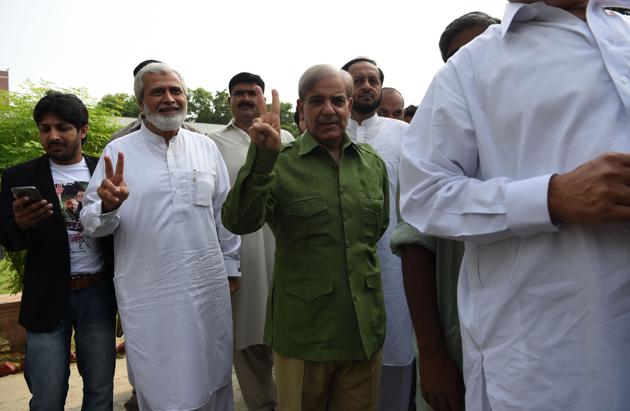Pakistan election 2018: A timeline of major events in Pak’s 70-year political history
On the day of Pakistan Assembly elections 2018, here is a timeline encompassing major political and other events in Pakistan’s history
Pakistanis are to vote on Wednesday in the third consecutive general elections in their nation’s 71-year-long history to take place without political upheaval, a crisis or a military intervention.

Four military governments had ruled Pakistan for almost half of its existence and in its young democracy, no civilian prime minister has ever completed a full, five-year term in office without some sort of crisis. In some cases, parliaments were dissolved, a prime minister was ousted or replaced, the military staged a coup or early elections were forced.
Here is a timeline encompassing major political and other events in Pakistan’s history:
__Aug. 14, 1947: Pakistan emerges as a sovereign state after getting independence when the departing British left India and split the subcontinent;
__Sept. 11, 1948: Pakistan’s founder Mohammad Ali Jinnah dies;
__Oct. 16, 1951: Pakistan first prime minister, Liaquat Ali Khan, is assassinated in a gun attack at a rally in the city of Rawalpind, triggering political instability;
__Oct. 7, 1958: President Iskander Mirza abolishes the constitution and declares martial law; Gen. Muhammad Ayub Khan, then army chief becomes administrator;
__Oct. 27, 1958: Ayub forces the president to step down; Mirza is sent to exile in Britain where he later dies; Ayub declared himself president;
__March 25, 1969: After months of rioting in West and East Pakistan, Khan hands over power to army chief Gen. Agha Mohammed Yahya Khan;
__Dec. 7, 1970: East Pakistan-based Awami League wins general elections; Yahya Khan delays transfer of power, triggering widespread rioting in East Pakistan; civil war breaks out;
__Dec. 16, 1971: Pakistan troops surrender in East Pakistan after Indian armed intervention in the civil war; East Pakistan becomes independent Bangladesh;
__Dec. 20, 1971: Yahya Khan resigns, Zulfikar Ali Bhutto becomes president; a parliamentary system of government is adopted and Bhutto becomes prime minister;
__July 5, 1977: Army chief Gen. Ziaul Haq seizes power;
__April 4, 1979: Bhutto is hanged after the Supreme Court upholds death sentence on charges of conspiracy to murder and Gen. Zia rejects a mercy petition; Bhutto’s daughter, Benazir Bhutto, takes up her father’s legacy;
__Aug. 17, 1988: Gen. Zia dies in a mysterious plane crash;
__Nov. 16, 1988: Benazir Bhutto becomes Pakistan’s first woman prime minister;
__Aug. 6, 1990: Benazir Bhutto’s government is dismissed amid charges of corruption and mismanagement;
__Oct. 24, 1990: Parliamentary elections are held and Nawaz Sharif becomes prime minister;
__April 19, 1993: President Ghulam Ishaq Khan dismisses Sharif government on corruption charges but the Supreme Court reinstates Sharif; Sharif and Khan fail to reconcile and end conflict so the then-army chief Gen. Waheed Kakar forces both to resign;
__Oct. 6, 1993: Bhutto is voted back into power after mass demonstrations lead to the early dismissal of her 1990 successor, Sharif;
__Nov. 5, 1996: Bhutto’s government is again dismissed amid renewed charges of corruption and incompetence raised by her party’s leader, Farooq Leghari;
__Feb. 3, 1997: Elections bring Sharif back to power; Bhutto goes into self-exile to avoid prosecution on corruption allegations;
__Oct. 12, 1999: Army chief Gen. Pervez Musharraf ousts Sharif’s government in a bloodless coup after Sharif fails in his attempt to sack the army chief. Sharif is sent into exile after a court convicts him of conspiracy against Musharraf;
__Oct. 10, 2002: Elections are held under Musharraf and pro-Musharraf parties form government; Zafarullah Jamali becomes prime minister on Nov. 21, 2002;
__Aug. 23, 2004: Shaukat Aziz became 23rd prime minister after Jamali resigns over differences with Musharraf;
__Oct. 5, 2007: Musharraf issues a controversial national reconciliation law after striking a deal with Bhutto that paves way for elections later in the year and the return home of both Bhutto and Sharif;
__Nov. 3, 2007: Musharraf imposes state of emergency, sacks top judiciary officials to pre-empt a court verdict against his presidency;
__Dec. 27, 2007: Bhutto is assassinated in a gun-and-bomb attack after addressing an election rally in Rawalpindi;
__Feb. 18, 2008: Elections are held and Bhutto’s Pakistan People’s Party emerges as winner; Yousuf Raza Gilani becomes prime minister.
__Aug. 18 2008: Musharraf resigns from his post as president under pressure;
__Sept. 6, 2008: Bhutto’s husband Asif Ali Zardari becomes president;
__May 2, 2011: Osama bin Laden is killed in a U.S. Navy SEALs raid in the army garrison town of Abbottabad;
__June 19, 2012: Supreme Court disqualifies Gilani as prime minister for not complying with a court order to request a Swiss court reopen corruption cases against Zardari;
__June 22, 2012: Raja Pervez Ashraf becomes prime minister, completes his term on March 16, 2013;
__May 11, 2013: Sharif’s party, the Pakistan Muslim League, overwhelmingly wins in general elections, he becomes prime minister for third time;
__ July 28, 2017: Sharif is disqualified from office by the Supreme Court on corruption charges stemming from so-called leaked Panama papers;
__Aug. 1, 2017 Sharif’s confidant Shahid Khaqan Abbasi is sworn in as prime minister;
__May 31: Abbasi’s government completes its term in office and elections are scheduled for July 25;
__July 6: Anti-graft tribunal convicts Sharif in absentia and sentences him to 10 years in prison, his daughter and son in-law are sentenced to lesser term;
__July 13: Sharif returns home from London where his ailing wife is in hospital; he and his daughter are arrested after landing and taken to a jail in Rawalpindi.






